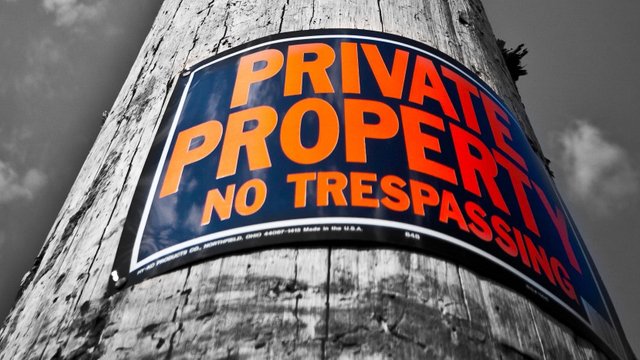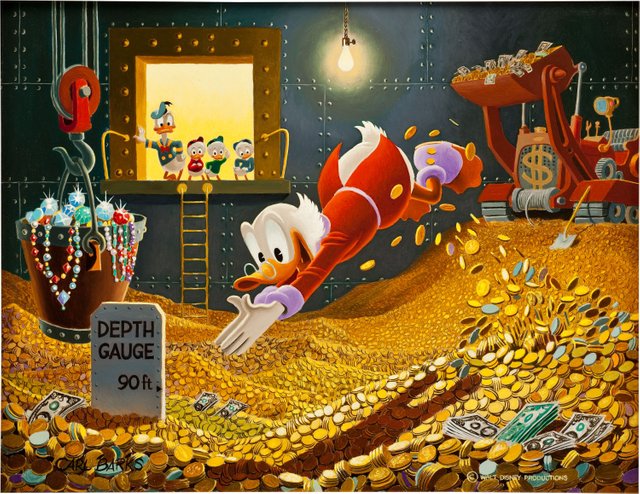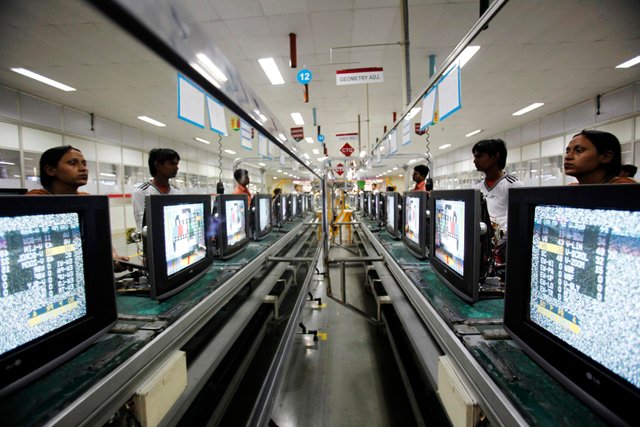Private and Personal Property: A Distinction Without a Difference
The build up is long but worth it. I promise.
The purpose of property rights is to mitigate conflict over scarce, rivalrous resources. To have a property right over a scarce, rivalrous resource is to have the right to exclude others from using that resource in the attainment of some ends. For example, I have property rights over my body, which means I can exclude others from using my body for sexual pleasure or labor without my consent. If they do access my body in such a way without my consent, it's called rape or slavery, respectively. Likewise, I have property rights over the accumulated capital for which I consensually trade my time and labor, which means I have the right to exclude people from using my accumulated capital without my consent. When someone accesses my accumulated capital in such a way without my consent, it's called theft or trespass.
Scale doesn't change this. If I transform my accumulated capital into a factory by hiring people who voluntarily exchange the product of their labor for some of my accumulated capital, this means that they value what they receive in exchange for working more than they value the direct product of their labor (the factory). Likewise, it means I value the factory more than the accumulated capital I gave up for it. This is a win-win situation, or a positive sum game. The workers I hired retain property rights over the capital they received as payment for their labor, which means they can exclude others from the use of their newly acquired accumulated capital, and I retain property rights over the factory, which means I can exclude others from the use of my factory.
Discrepancies between marginal benefit don't change this either. A consensual exchange doesn't become theft just because one party benefits more from the exchange than another. If this wasn't the case, every single instance of buyer's remorse would be indicative of theft. If someone agrees to produce a walking stick in exchange for ten dollars and the purchaser of the walking stick then sells it to someone else for twenty dollars, how can it be claimed that the producer of the walking stick was a victim of theft if they haven't been deprived of the ten dollars for which they voluntarily exchanged the walking stick? Would it have been reasonable to expect that the first purchaser of the walking stick wouldn't have obtained more than ten dollars of value from it given that the exchange wouldn't have happened in the first place if they hadn't valued the walking stick more than they valued ten dollars?
Of course not. Anything that happens to the walking stick after the original exchange is no business of the producer of the walking stick because said producer already exchanged his property rights to the walking stick for property rights to a different form of accumulated capital (ten dollars).
Likewise, if I use more of my accumulated capital to hire workers to work in my factory, they will only accept my offer of employment if they value what I'm offering more than their own free time and more than whatever stake they may have otherwise had in the product they will be producing. In other words, if they accept employment, it will be with the understanding that they're giving up any stake in what they're producing in exchange for what I'm offering them. Maybe my factory assembles televisions. Maybe one worker can produce one television per hour. Would they be able to produce televisions this efficiently without my previous investment in production capital (which hasn't even been recouped and probably never will be completely given that maintenance, employment and higher order production good costs are a revolving door)? Would they be able to produce televisions AT ALL without this previous investment in production capital? Of course not, and they know this, which is why they're willing to give up both their leisure and whatever stake their labor may have otherwise entitled them to in the production of a television in exchange for a fixed amount of accumulated capital.
As was the case with the walking stick, whatever happens to the television after this exchange occurs is no business of the worker. How could the future sale of the television constitute theft of the worker's accumulated capital if it can't be demonstrated that the worker was deprived of the accumulated capital that he voluntarily accepted as payment for the production of the television, especially given that the television was produced with other accumulated capital (plastic, circuits, labor saving devices, etc.) that the worker never even owned?
It can't.
Property ownership necessarily implies exclusivity, which means that "private property" is redundant, as is "personal property". The words "private" and "personal" denote exclusivity, which is already implied by the word "property". To differentiate between "personal property" and "private property" is therefore a distinction without a difference. This implication of exclusivity also means that "public property" is a contradiction in terms. If no one can be excluded from using the resource, it isn't property. Resources that aren't scarce or rivalrous likewise can not be considered property, which means that "intellectual property" is also a contradiction in terms.
Seizing the means of production is a therefore a genuine form of theft (rather than a form of restitution) and that the "pirating" of music, software, art and writing is not, which may seem counter-intuitive if you attended the indoctrination camps euphemistically known as "public schools" when you were growing up.
I'm Jared Howe and I'm a Voluntaryist hip hop artist and professional technical editor/writer with a passion for Austrian economics and universal ethics. You can catch my podcast every Friday on the the Seeds of Liberty Podcast Network.




You made some great points in this post. Interesting read indeed.
Thanks for your time and feedback!
I love your thinking. Information wants to be free. If you "take" someone's song or picture or movie, they still have it. They have been deprived of nothing. This isn't to say that people can't be rewarded for generating amazing stuff; steemit is a great example of how people can be rewarded for their thoughts, even though it's not property.
Exactly! You've hit the nail on the head on why copying isn't theft. And, as we're currently demonstrating, content creators can still be compensated for creating content with open access and no barriers to entry (other than that you need a computer and an internet connection)
On point as usual homie...
@jaredhowe interesting read. To throw in some legalese, taking another's property is known as conversion.
Awesome post @jaredhowe Ive never made more than 80 cents myself and I think my quality is pretty good as a new whale I would appreciate your support Here on my post
Fuckin' great read! Gonna send to all my commie leaning aquantances.
I'd be very interested in an expansion of your thesis that "... 'intellectual property' is also a contradiction in terms." This has been a very "lively" topic elsewhere, with some prominent libertarian thinkers holding strongly differing positions. I infer that your position is that the words written and published as a book cannot be considered as property and that the author cannot seek recourse if those words are used by others either for monetary gain or merely presented as their own?
"I infer that your position is that the words written and published as a book cannot be considered as property and that the author cannot seek recourse if those words are used by others either for monetary gain or merely presented as their own?"
You infer incorrectly.
An actual physical book is made up of scarce, rivalrous resources like paper, and is therefore property. A compact disc is made of scarce rivalrous resources like plastic, and is therefore property. A computer's hard drive is made of scarce, rivalrous resources resources like aluminum, gold, silver, copper, etc., and is therefore property.
However, the patterns imprinted on the pieces of paper within the book are not a scarce, rivalrous resource because reproduction of these patterns doesn't consume or devalue the original pattern. Patterns are therefore not property as they can not exist independent of some media. Same goes for the compact disc and the computer's hard drive. The physical medias on which patterns are imprinted are scarce, rivalrous resources; the patterns imprinted on the physical medias are characteristics of the physical media. Characteristics are not scarce, rivalrous resources. For example, if you own a blue Corvette, you own the car and you own the paint on the car (both of which are scarce and rivalrous), but you do not own "the color blue". You own the thing; not the characteristics of the thing.
When someone copies something, they are therefore changing the characteristics of scarce, rivalrous resources that they presumably already owned (like a compact disc or a hard drive). This doesn't effect the physical media on which the pattern was originally imprinted and it doesn't affect the integrity of the pattern itself. "Copying" isn't "theft". When theft occurs, the original owner no longer has the original. The same can't be said about copying. When someone copies something, the owner still has the original. There's no way to demonstrate damages when someone copies you because no one is entitled to projected future profits. To seek IP protection is therefore to seek protection from market competition. To enforce "IP laws" is to take real accumulated capital from people and redistribute it to a market loser who couldn't figure out how to benefit without the initiation of aggression and physical force. How is this behavior any different than a bank seeking a bailout?
"This has been a very "lively" topic elsewhere, with some prominent libertarian thinkers holding strongly differing positions."
I suspect that the underlying for reason this is that several prominent libertarians have a conflict of interest in that they can't image a way in which they could be compensated for their services absent monopoly protectionism. I don't see why that creates obligations on other people to not use their own property how they see fit. The original "IP" legislation was called "monopoly law" and it was designed to prevent competition in the printing industry. "IP" is literally a euphemism for "government protected monopoly on patterns of information". Given that enforcement requires the use of force against people who haven't harmed the bodies or property of anyone, "IP" is inherently anti-libertarian.
Forgive my 'density', but it seems to me that after you say that I inferred incorrectly, you proceed to agree with my inference.
As to the second pull-quote, I assure you that said libertarians would disagree that "monopoly protectionism" is their goal; rather they seek to protect the fruits of their labors from theft.
Note, please, that I do not have a dog in this fight. I'm just an interested observer.
Perhaps I thought you were asking if the book itself was "intellectual property".
Let's approach this using the Socratic method. How does the hard drive on my computer become the fruit of someone else's labor if I use it to copy information that doesn't deprive them of the physical media on which the pattern is originally stored? How does my accumulated capital become the fruit of someone else's labor? Doesn't the act of copying require one to expend accumulated capital/do work? How is a non-scarce resource the product of labor? Wouldn't it be more accurate to say that the fruits of their labor were whichever media they originally imprinted the pattern on? How could a pattern exist absent a physical media? How could someone own something that doesn't tangibly exist in the physical world?
Because they didn't create the physical media, they created the IP
That's irrelevant to the issue at hand. The copies are not valuable because of the medium they're in, the copies are valuable because of the original IP.
It doesn't have to.
It's called intellectual property. That's how. All ownership is an abstract construction, so your physicalist argument is irrelevant.
Well you might want to rephrase that, because it's obviously false. The patterns, aka words in this case, definitely have great monetary value, much more than the paper they are printed on. Making reproductions greatly devalues the original. If there are 1000 copies of a very popular story, those copies will be worth a ton. If there's 1000000 copies, they will be worth far less.
This is not an accurate analogy. You didn't invent the color blue. If you create a piece of writing or music, you are inventing that pattern.
Things don't "have" value. Value is an expression of subjective preference that happens on an individual by individual basis. I value happiness but happiness isn't property. I value love but love isn't property. I value warm summer days but warm summer days aren't property.
Hmmm that's a really cool perspective. In my mind, it creates an implication that - if things don't have value, but can still be valued, it means the individual is the one with value, and they choose to give it out on a case by case basis. That's pretty awesome.
It takes more than a value judgment to make property. Also, the producer of a good isn't the decider of value; the consumer is. Thing are only worth what consumers are willing to pay.
Except "IP" isn't a consumer good because, as I've demonstrated, it's not even property
I don't think you did demonstrate that IP isn't property.
I reject the idea that the Consumer OR the Producer of a good decides the value. Emotional value, sure, but monetary value, no. It's not an OR situation. The producer gives it a value, and if their goal is to sell it, they may or may not lower the value to match the consumer's valuation.
Can you demonstrate a difference between emotional and monetary value given that value judgments happen in the minds of the observer? As I said earlier, value isn't "in" things; it's in the mind of the observer. I get "emotional value" from using cannabis, but it still costs money. The fact that I'm willing to part with the money in exchange for the cannabis means I get more "emotional value" from the cannabis than I do from the money.
Again I don't see how there's a difference given that assigning something a "monetary value" is the same as saying you value it more than that amount of money. I think you've made a distinction without a difference.
"That's not an accurate analogy."
It wasn't even an analogy. It was a practical example of the principles discussed.
Can you explain how ALL the Earth's resources are the property of whomever can TAKE them from under whoever is living on the land from which they need to be extracted, and violently enforce their claim?
I don't think the Earth's resources, especially air and water, can be property, or should be privately owned.
Socialist drive me up a wall. thank you for your constant smack down of their "arguments" -D
awesome write up bud
I upvote U